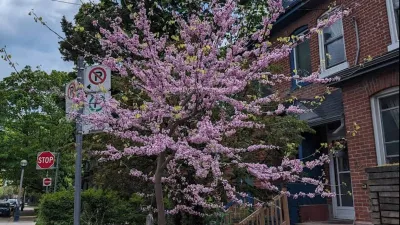A government-appointed panel has recommended raising Ontario's gas tax to help pay for an ambitious 25-year transit construction plan dubbed the "Big Move". Political opponents were quick to reject the proposal.
"Toronto-area drivers should pay for most of an ambitious transit expansion through a sharply higher gas tax, a government-appointed panel is recommending, but the promised sweetener is that motorists can expect to come out ahead by preventing even worse congestion," report Oliver Moore and Adrian Morrow.
"The comprehensive report from a panel headed by Anne Golden landed Thursday. It lays out ways for the province to pay for the so-called Big Move – which proposes a network of transit lines intended to tackle congestion currently estimated to cost the Toronto area $6-billion annually – and suggests gradually increasing the gas tax by as much as 10 cents a litre, which would cost the average household $260 per year."
"The panel lays out two options, both of which use gas taxes to fund the bulk of transit," Moore and Morrow explain. "Each option would raise money across the province, with only the funds generated locally being used in the Toronto area. Money raised elsewhere will be spent in those communities."
An alternative financing plan released by the Toronto region's transportation agency in May relied on an increase in the provincial sales tax (HST), in combination with a more modest gas tax increase, parking levy, and increased developer fees, to pay for the project.
FULL STORY: Hike gas tax to pay for new Toronto transit, panel recommends

Alabama: Trump Terminates Settlements for Black Communities Harmed By Raw Sewage
Trump deemed the landmark civil rights agreement “illegal DEI and environmental justice policy.”

Planetizen Federal Action Tracker
A weekly monitor of how Trump’s orders and actions are impacting planners and planning in America.

The 120 Year Old Tiny Home Villages That Sheltered San Francisco’s Earthquake Refugees
More than a century ago, San Francisco mobilized to house thousands of residents displaced by the 1906 earthquake. Could their strategy offer a model for the present?

In Both Crashes and Crime, Public Transportation is Far Safer than Driving
Contrary to popular assumptions, public transportation has far lower crash and crime rates than automobile travel. For safer communities, improve and encourage transit travel.

Report: Zoning Reforms Should Complement Nashville’s Ambitious Transit Plan
Without reform, restrictive zoning codes will limit the impact of the city’s planned transit expansion and could exclude some of the residents who depend on transit the most.

Judge Orders Release of Frozen IRA, IIJA Funding
The decision is a victory for environmental groups who charged that freezing funds for critical infrastructure and disaster response programs caused “real and irreparable harm” to communities.
Urban Design for Planners 1: Software Tools
This six-course series explores essential urban design concepts using open source software and equips planners with the tools they need to participate fully in the urban design process.
Planning for Universal Design
Learn the tools for implementing Universal Design in planning regulations.
Clanton & Associates, Inc.
Jessamine County Fiscal Court
Institute for Housing and Urban Development Studies (IHS)
City of Grandview
Harvard GSD Executive Education
Toledo-Lucas County Plan Commissions
Salt Lake City
NYU Wagner Graduate School of Public Service



























